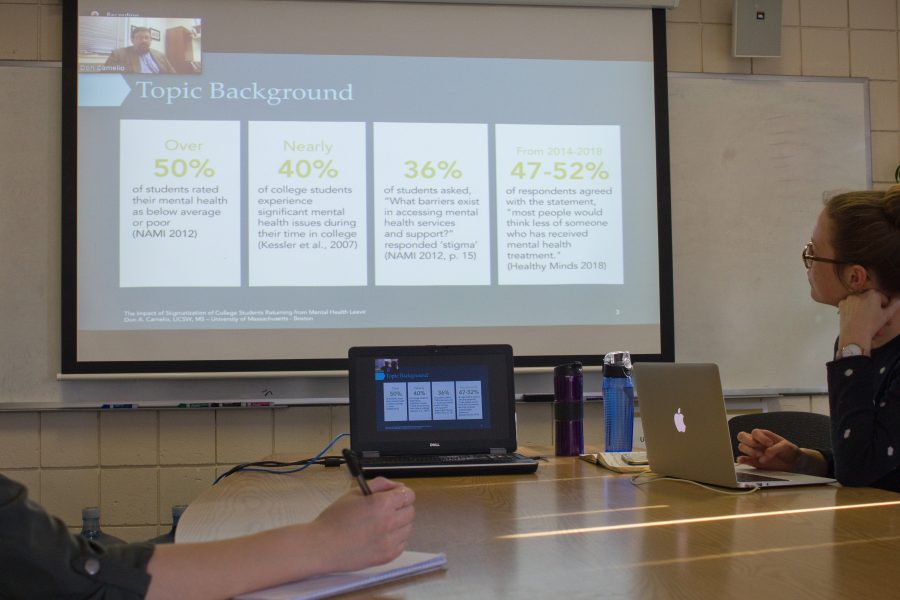Thursday, March 21—The Sociology Department at the University of Massachusetts Boston live-streamed Don Camelio’s dissertation defense to the dissertation committee in Wheatley Hall. Camelio as well as the committee were off-campus and the video conference between them was streamed in W04-0022. Camelio, a sociology Ph.D. student, researched “The Impact of Stigmatization on College Students Returning from Mental Health Leave.” During his dissertation, Camelio presented his background for the study, research questions, findings, and overall conclusions on what he found.
The purpose of his study was to “better understand the real and perceived experiences faced by these students to potentially uncover those factors that have negative or positive effects on stigma.” In short, his research question overall is about college students taking mental health leaves as a result of their mental health issues, and the impact of stigmatization on the students upon their return to class.
Camelio kicked off his dissertation with background information on the topic as well as the research questions that he wanted to answer. The questions that Camelio asked while researching were: “What are the experiences of stigma for college students taking a mental health leave? Are there factors that enhance/diminish this experience?” With these initial research inquiries, Camelio began his research on college students.
To start his research, Camelio used a small group of students to focus his study on: college students ranging from 18 to 25 years old, going to the same school, and all returning back from a mental health leave. The students came from different racial backgrounds, housing situations, family structure, and mental health issues. From this sample of students, Camelio conducted intensive qualitative interviews that were focused on lived and perceived experiences with stigma against people with mental health issues.
Camelio talked about how he used multiple sociological theories for his background on researching the topic. These theories include grounded theory, labeling theory, Goffman’s theory of social stigma, and modified labeling theory. Using a mix of the grounded and labeling theory, Camelio was able to interpret and understand his data. To compare the data that he found, Camelio used data analysis coding and memoing.
From his interviews using the employed strategy and the outcome, Camelio found that in some areas stigma does exist and students have a negative experience when sharing with family and those in the workplace. On the other hand, they all had positive experiences with support and success during leave from the school. This gave the students the empowerment to return and they felt that the label doesn’t matter.
The conclusions of this study found that students taking a mental health leave do experience negative stigma along their journey, but with the help of support from the college, students were able to get positive feedback in a fairly positive environment. Overall, there are still future research questions to be asked about students who take a leave of absence due to their mental health issues.
At the end of his research discussion, the committee asked their questions and commented on what they thought about his dissertation as well as what could be researched more and his thoughts on it. Camelio gladly responded to each question after careful deliberation. The dissertation ended with the committee further discussing their thoughts on Camelio’s research.
*All information is from Don Camelio’s research and PowerPoint presented at the event.
Dissertation Defense by Don Camelio
March 22, 2019





















































